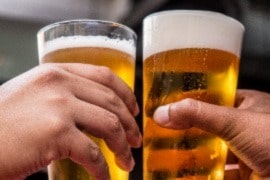Xarelto is a blood thinner used to prevent strokes, but specific interactions can occur when mixing this drug with alcohol.
Article at a Glance:
The goal of blood thinners, such as Xarelto, is ultimately to prevent strokes and to prolong one’s life. The misuse of alcohol in combination with blood thinners is risky.
A Consumer Reports article listed alcohol consumption as dangerous for those taking blood thinners. It also stated that nearly 42% of adults partook of alcohol while on medication. Is there a safe amount of alcohol to drink while on Xarelto? The NHS states that moderate use of alcohol is permissible such as no more than two drinks per day in a week.
Before making any decisions concerning drinking alcohol while taking Xarelto, it’s best to follow up with your physician. Remember these key points before you mix the two substances:
- Increased risk for internal bleeding
- Increased risk for strokes
- Increased risk for falls or injury to the body
Alcohol and Xarelto
As with most medications, Xarelto has potential negative side effects. These side effects can be worsened when Xarelto is combined with alcohol.
Xarelto is a commonly prescribed oral blood thinner used to prevent blood clots and strokes. An estimated two to three million Americans take blood thinners such as Xarelto. Xarelto treats health conditions like atrial fibrillation (a heart dysrhythmia), which affects up to six million people in America.
Uncontrolled atrial fibrillation can lead to stroke, which is ranked as the fourth-highest cause of death and the number one reason for disability among American adults. It is safe to say, then, that blood thinners such as Xarelto can be life-saving.
Side Effects of Mixing Xarelto and Alcohol
What side effects should a person look out for if they are taking Xarelto? The most worrisome side effect that concerns physicians and those who take blood thinners is bleeding. Blood thinners actively thin the blood and prevent it from coagulating or forming clots, which is especially important for those at risk for strokes.
However, because the blood is thinned, it may lead to some unwanted or even dangerous bleeding.
Common, or “nuisance bleeding” that is not life-threatening includes:
- Frequent nosebleeds
- Bleeding from shaving lasting up to five minutes
- Prolonged bleeding from superficial cuts or tears to the skin
Life-threatening bleeding events can also occur when someone is taking Xarelto.
What impact does alcohol consumption have on these risk factors? Alcohol is a substance known to thin the blood, with some studies showing that the moderate use of alcohol can even act as a potential blood thinner. Therefore, it is important that individuals who take blood thinners such as Xarelto exercise extreme caution when it comes to the consumption of alcohol.
Mixing Xarelto and alcohol can increase the risk for major bleeding episodes such as:
- Blood present in the urine or stool
- Coughing up blood or blood clots
- Any bleeding from a wound or cut lasting longer than 10 minutes
- Heavier than normal menstrual flow
- Abnormal bruising that grows in size
- Severe headaches
All of these side effects are signs that a person may have uncontrolled bleeding and should seek immediate medical help.
Other risks of mixing Xarelto and alcohol include an increased risk of experiencing a stroke, falling and injury to the body.
If you or someone you know is taking Xarelto and exhibits risky behavior concerning alcohol consumption, please reach out to us at The Recovery Village. You can contact us at one of our many locations, or speak to one of our representatives concerning one of our comprehensive treatment plans.
Articles Related to Alcoholism

Alcohol detox isn’t easy and not everyone can do it on their own. That is why alcohol detox and alcohol withdrawal treatment is administered by medical professionals.

Alcoholism takes many forms, and the stereotype doesn’t always hold true. So when do a few drinks with friends become a full-blown alcohol addiction? How do you know if you are an alcoholic?

While cirrhosis scars from excessive drinking are irreversible, quitting alcohol and leading a healthier lifestyle can help your liver heal from alcohol-related liver disease.

When detoxing, hydration is key. However, certain food groups also have benefits when it comes to helping with the discomfort of withdrawal symptoms and detoxification.

Detox from alcohol can begin within hours. Typically, alcohol withdrawal symptoms happen for heavier drinkers. Alcohol withdrawal can begin within hours of ending a drinking session.

Daily drinking can have serious consequences for a person’s health, both in the short- and long-term. Many of the effects of drinking every day can be reversed through early intervention.


National Blood Clot Alliance. “Living Your Best Life While Taking Blood Thinners.” Accessed April 24, 2019.
Centers for Disease Control and Prevention. “Atrial Fibrillation Fact Sheet.” August 22, 2017. Accessed April 24, 2019.
Ovbiagele, B., Nguyen-Huynh, M.N. “Stroke Epidemiology: Advancing Our Under[…]echanism and Therapy.” July, 21, 2011. Accessed April 24, 2019.
Sciencedaily.com. “Moderate Alcohol Consumption Can Act As A ‘Blood Thinner.’” October 14, 2005. Accessed April 24, 2019.
NHS. “Rivaroxaban.” July 2, 2018. Accessed April 24, 2019.
Mitchell, Steve. “Don’t Drink Alcohol While Taking These Medications.” Consumer Reports, December 29, 2016. Accessed April 24, 2019.
The Recovery Village aims to improve the quality of life for people struggling with substance use or mental health disorder with fact-based content about the nature of behavioral health conditions, treatment options and their related outcomes. We publish material that is researched, cited, edited and reviewed by licensed medical professionals. The information we provide is not intended to be a substitute for professional medical advice, diagnosis or treatment. It should not be used in place of the advice of your physician or other qualified healthcare providers.